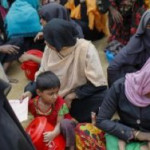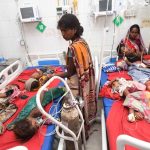Overemphasis on Zero Budget Natural Farming (ZBNF) to reduce cost of production and double farmer incomes must be analysed critically and holistically. The adoption of high-yielding variety (HYV) seeds along with irrigation, chemical fertilisers, associated package of practices and strong policy support (credit, MSP, etc) ushered in Green Revolution during the 1960s. Source: IFPRI South Asia Office
Biofortified staples may hold the key to India’s rural malnutrition
The National elections in India may well be over, but the persistent issue of malnutrition still holds the nation in its tight grip. And yet, of the myriads of topical issues that comprised political propaganda, including caste, religion, employment, farmer upliftment, and even social transfers, none of the political parties raised this critical issue. The twin problems of malnutrition and nutritional insecurity are particularly severe in rural India. Source: IFPRI South Asia Office
Rohingya in Bangladesh are surviving – but their long-term prospects are grim
Paul Dorosh and John Hoddinott Note: Join us July 10 as the authors and other participants discuss their survey of Rohingya refugees in Bangladesh at an IFPRI policy seminar. It’s been nearly two years since 671,000 Rohingya fled violence and persecution in Myanmar for the safety of Cox’s Bazar, near the southeastern tip of Bangladesh. [Read More...] Source: IFPRI South Asia Office
Communicating Market Analysis: Writing Workshop
Rigorous policy analysis is important. And understanding how to communicate the results of that analysis in a clear succinct way is critical for application to policy decisions. With this in mind, IFPRI-Ghana organized a 3-day policy brief writing workshop on 4 – 7 June 2019 for staff from the Statistical Research and Information Department (SRID), […] Source: IFPRI Ghana
Stopping Muzaffarpur Child Deaths Will Require a Gender-Sensitive Social Analysis
Muzaffarpur is emblematic of a hot spot for undernutrition in India. With one in two children stunted, Muzaffarpur lags India’s average by ten percentage points. One in two women is anaemic and one in three is underweight. Although most infants are breastfed and exclusive breastfeeding is high, other aspects of infant diets are abysmal and childhood illness is high. Other social determinants of malnutrition – early marriage, poverty, open defecation and more – offer a case study in what one could call a “perfect storm” of risk factors. Source: IFPRI South Asia Office
- « Previous Page
- 1
- …
- 12
- 13
- 14
- 15
- 16
- …
- 26
- Next Page »




